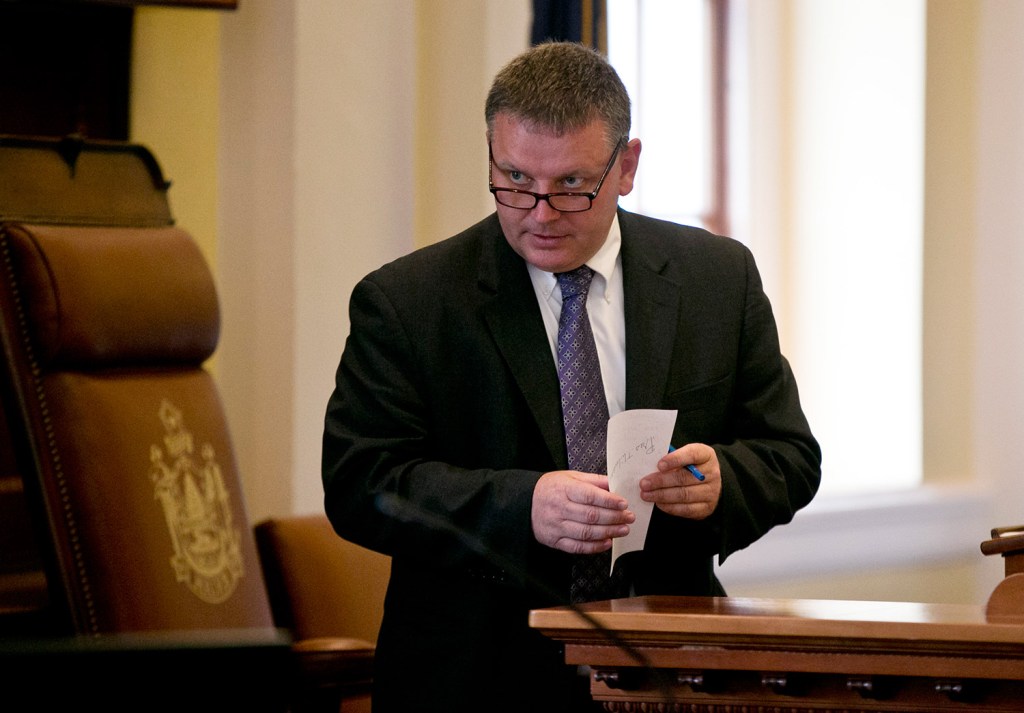Gov. Paul LePage’s explanation for making a racially charged remark was met with a mix of approval, rejection and silence from Maine’s political leaders Friday.
While some of the state’s leading Republicans said the governor’s response was appropriate, others said he didn’t go far enough. Those who didn’t comment on the controversy included three of the state’s four members of Congress.
LePage’s comment during the town hall in Bridgton on Wednesday about out-of-state drug dealers who “impregnate a young white girl before they leave” continued to trigger broad political fallout, with Democratic U.S. Rep. Chellie Pingree on Friday calling it “disgraceful and racist.”
A spokeswoman for Republican U.S. Sen. Susan Collins didn’t follow up on a request for a comment from Collins on Friday. U.S. Sen. Angus King’s office didn’t respond to requests for a comment.
Brendan Conley, a spokesman for U.S. Rep. Bruce Poliquin, didn’t return a phone message and an email seeking an interview or comment. It was the second day Collins, King and Poliquin didn’t respond to requests for comment.
Some of the nation’s top Democrats did weigh in.
Both the Democratic National Committee and Hillary Clinton’s presidential campaign criticized the statements as racist. Meanwhile, New Jersey governor and presidential hopeful Chris Christie didn’t respond to the DNC’s demand that he renounce LePage’s endorsement of Christie’s bid for the Republican nomination. Attempts to contact Christie’s campaign weren’t successful Friday night.
On Friday, the Maine Democratic Party and Emily Cain, who is seeking the Democratic nomination for Congress in the 2nd District, sent out fundraising emails in an effort to capitalize on the controversy.
During his news conference Friday, LePage at first said he made a mistake by referring to “a young white girl,” rather than “Maine women.” He went on to chastise the media.
“The governor’s press conference today was very strange,” said Lance Dutson, a Republican consultant who runs the Get Right Maine website, which seeks to restore a more moderate brand of Republicanism in Maine. “I don’t think it qualifies as an apology. I think apologizing to the women of Maine for making racially charged statements I think shows he doesn’t take this criticism seriously.”
State Senate President Michael Thibodeau, R-Winterport, issued a written statement Friday condemning LePage’s original remarks.
“The governor’s comments in Bridgton were inappropriate,” said Thibodeau, who has been at odds with the governor. “Furthermore, they detract from the focus we should have in combating the drug crisis here in Maine.”
A spokesman for Thibodeau said the Senate president didn’t want to discuss the matter further, or address comments the governor made at the news conference.
Richard Bennett, chair of the Maine Republican Party, said he accepted LePage’s apology for comments that “introduced an element of race” into an important policy debate over combating Maine’s heroin crisis.
“I know the governor. He’s not a racist,” Bennett said. “It was appropriate for him to apologize.”
Bennett said time will tell whether the comment will have an effect on the party in general. The real test, he said, is whether people think LePage was sincere in his apology.
“I certainly think he’s a sincere man who feels passionately about fixing things that he sees as wrong in Maine and this heroin epidemic is very personal to him and he wants to combat it as effectively as possible,” Bennett said. “The unfortunate aspect of his inappropriate and ill-chosen words is that it has distracted from that.”
Dutson commended Bennett and Thibodeau for speaking out, but believes the comments, which he described as an “appalling,” “factually inaccurate” and “racist statement,” will hurt the party.
“He is the biggest problem Maine Republicans have had in ages,” Dutson said. “Around every legislator’s neck is this anchor of Paul LePage that they have to deal with and it’s very troublesome.”
Pingree said in a written statement that the comments, coming less than two weeks before Martin Luther King Day, were offensive to everyone, especially African Americans.
“It does not represent the values of Maine people and is embarrassing to our state,” she said. “And although the governor seems to regret getting caught making those remarks, he also seems unwilling to apologize to the community that he has insulted.”
James Melcher, a political science professor from the University of Maine at Farmington, said the comment won’t likely affect state legislative races, unless the governor persuades voters that the 2016 election should be a referendum on him and those who support his policies. Voters likely will make up their minds based on how they feel about the candidates, not LePage, Melcher said.
“How it affects people’s view of Maine outside the state may be more of an issue,” he said.
Rob Poindexter, communications director for the Maine House Republicans, said House Minority Leader Kenneth Fredette and other House Republicans don’t want to wade into the controversy.
“We’re staying out of it,” Poindexter said, noting the House members are vetting a bill to address the heroin crisis, which is expected to reach the House floor next week. “They’re focused right now on working on the issue at hand.”
Melcher said it’s probably a wise move for Republicans to remain silent, to insulate themselves from attacks from fellow party members. But their lack of support for the governor should not be overlooked, he said.
“I can see why they don’t want to stir up trouble in their own party,” he said. “At the same time, I think by not speaking out and not defending him, I don’t think you have to read between the lines too carefully to figure out that that is making a statement in and of itself.”
Send questions/comments to the editors.


